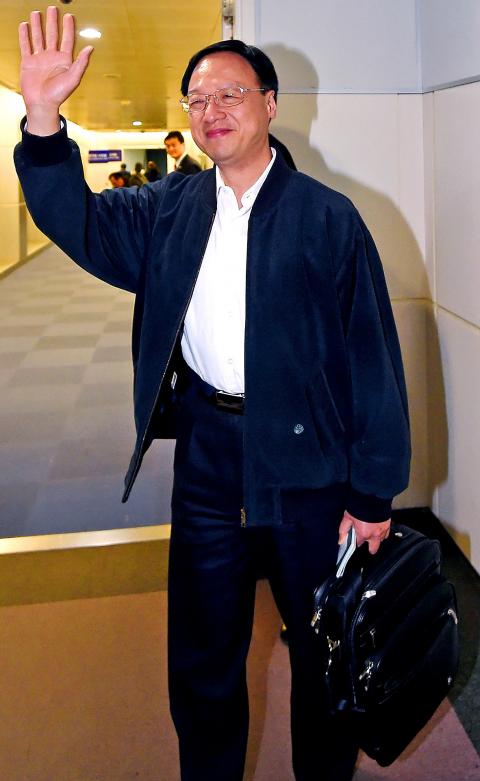Former premier Jiang Yi-huah (江宜樺), who resigned following the Chinese Nationalist Party’s (KMT) landslide defeat in last year’s nine-in-one elections, yesterday left for the US to serve a year as a visiting academic at Harvard and Stanford universities.
Jiang left a day after being named as one of the Presidential Office’s senior advisers.
The Presidential Office announced a new list of senior advisers and national policy advisers, who are to remain in their positions until May 19 next year.

Photo: Chu Pei-de, Taipei Times
It is likely to be the last adviser appointment before President Ma Ying-jeou’s (馬英九) second term ends.
The list includes former Presidential Office secretary-general Timothy Yang (楊進添) and former Examination Yuan president John Kuan (關中) as senior advisers — the other 24 positions were chosen by reappointment.
Jiang was a political science professor at National Taiwan University before he joined the Ma administration in 2000, taking the positions of minister of the research, development and evaluation commission, minister of the interior, vice premier and premier.
Jiang earned his doctorate at Yale University, specializing in political philosophy and Hannah Arendt’s political theory.
He cited Arendt twice in a speech given before leaving the Cabinet, referring to her idea of the public sphere and her words saying that a life spent entirely in the public realm would become shallow.
The former premier left the Cabinet amid controversies, including his decision to forcefully evict Sunflower movement protesters from the front square of the Executive Yuan on March 24 last year, a move that reportedly left scores of protesters injured.
Academia Sinica researcher Huang Kuo-chang (黃國昌), one of the leading protesters in the Sunflower movement, condemned the appointment.
“Though being Ma’s adviser is not something that could be seen as an honor, the nation’s official titles, however, should not be used as personal favors,” Huang said on Facebook on Friday after the announcement.
“Jiang, who caused so many injuries and has not yet offered any apology or been held accountable, is in no position [to receive the title],” he said.

The manufacture of the remaining 28 M1A2T Abrams tanks Taiwan purchased from the US has recently been completed, and they are expected to be delivered within the next one to two months, a source said yesterday. The Ministry of National Defense is arranging cargo ships to transport the tanks to Taiwan as soon as possible, said the source, who is familiar with the matter. The estimated arrival time ranges from late this month to early next month, the source said. The 28 Abrams tanks make up the third and final batch of a total of 108 tanks, valued at about NT$40.5 billion

A group from the Taiwanese Designers in Australia association yesterday represented Taiwan at the Midsumma Pride March in Melbourne. The march, held in the St. Kilda suburb, is the city’s largest LGBTQIA+ parade and the flagship event of the annual Midsumma Festival. It attracted more than 45,000 spectators who supported the 400 groups and 10,000 marchers that participated this year, the association said. Taiwanese Designers said they organized a team to march for Taiwan this year, joining politicians, government agencies, professionals and community organizations in showing support for LGBTQIA+ people and diverse communities. As the first country in Asia to legalize same-sex

MOTIVES QUESTIONED The PLA considers Xi’s policies toward Taiwan to be driven by personal considerations rather than military assessment, the Epoch Times reports Chinese President Xi Jinping’s (習近平) latest purge of the Chinese People’s Liberation Army (PLA) leadership might have been prompted by the military’s opposition to plans of invading Taiwan, the Epoch Times said. The Chinese military opposes waging war against Taiwan by a large consensus, putting it at odds with Xi’s vision, the Falun Gong-affiliated daily said in a report on Thursday, citing anonymous sources with insight into the PLA’s inner workings. The opposition is not the opinion of a few generals, but a widely shared view among the PLA cadre, the Epoch Times cited them as saying. “Chinese forces know full well that

Travel agencies in Taiwan are working to secure alternative flights for travelers bound for New Zealand for the Lunar New Year holiday, as Air New Zealand workers are set to strike next week. The airline said that it has confirmed that the planned industrial action by its international wide-body cabin crew would go ahead on Thursday and Friday next week. While the Auckland-based carrier pledged to take reasonable measures to mitigate the impact of the workers’ strike, an Air New Zealand flight arriving at Taipei from Auckland on Thursday and another flight departing from Taipei for Auckland on Saturday would have to